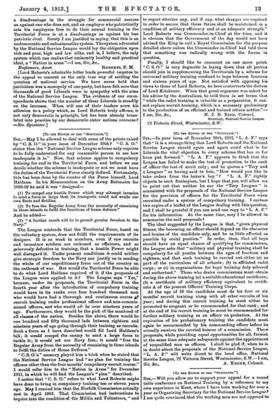[To THE EDITOR OF THE " SPECTATOR:] SIR,—May I be
allowed to deal with some of the points raised
by "0. S. 0." in your issue of December 28th ? "0. S. 0." states that the "National Service League scheme only requires to be fully understood for any reasonable person to see how inadequate it is." Now, that scheme applies to compulsory training for and in the Territorial Force, and before we can decide whether the scheme is inadequate or not we must have
the duties of the Territorial Force clearly defined. Fortunately, this has been done by the creator of the Force himself, Lord Haldane. In his Memorandum on the Army Estimates for 1808-09 he said it was "designed—
(1) To compel any hostile Power which may attempt invasion to send a force so large that its transports could not evade our own fleets and flotillas.
(2) To free the Regular Army from the necessity of remaining in these islands to fulfil the functions of home defence."
And he added—
(3) "A further result will be to permit greater freedom to the Navy."
The League contends that the Territorial Force, based on the voluntary system, does not fulfil the requirements of its designer. It is so weak in numbers, even if raw recruits and immature soldiers are reckoned as efficients, and so grievously defective in training, that a hostile Power might well disregard it. Under present conditions it could neither give strategic freedom to the Navy nor justify us in sending the whole of our expeditionary force out of the country on the outbreak of war. But would the Territorial Force be able to do what Lord Haldane required of it if the proposals of
the League were applied to it ? The League says "Yes," because, under its proposals, the Territorial Force in the fourth year after the introduction of compulsory training would have in its ranks over four hundred thousand men who would have had a thorough and continuous course gf recruit training under professional officers and non-commis- sioned officers, and who would all be over nineteen years of age. Furthermore, they would be the pick of the manhood of all classes of the nation. Besides the above, there would be one hundred and fifty thousand lads between eighteen and nineteen years of age going through their training as recruits. Such a force as I have described would fill Lord Haldane's bill ; it would compel the enemy to send a large force to tackle it; it would set our Navy free; it woukt "free the Regular Army from the necessity of remaining in these islands to fulfil the duties of Home Defence."
"0. S. 0.'s " memory played him a trick when he stated that the National Service League had "no plan for training the officers other than the four months' compulsory recruit course." I would refer him to the "Nation in Arms" for December 1911, in which he will find the League's "plan" described.
I notice that "0. S. 0." refers to what Lord Roberts might have done to bring in compulsory training ten or eleven years ago. May I remind him that the Norfolk Commission actually met in April 1903. That Commission had instructions to inquire into the condition of the Militia and Volunteers, "and
to report whether any, and if any, what changes are required in order to secure that these forces shall be maintained in a condition of military efficiency and at an adequate strength." Lord Roberts was Commander-in-Chief at the time, and it is obvious that the Government of the day would not have advised the King to call a Royal Commission for the purpose detailed above unless the Commander-in-Chief had told them that something was radically wrong with the forces in question.
Finally, I should like to comment on one more point. "0. S.0." is very dogmatic in laying down that all parties should join in supplementing the Territorials by a scheme for universal military training confined to boys between fourteen and sixteen years of age. Not satisfied with opposing his views to those of Lord Roberts, he here controverts the dictum of Lord Kitchener. When that great organizer was asked for his advice by the Australians, he told them in set terms that "while the cadet training is valuable as a preparation, it can- not replace recruit training, which is a necessary preliminary to the production of an efficient and trained citizen soldier."—
Secretary, National Service League.
72 Victoria Street, Westminster, S. W.






















































 Previous page
Previous page